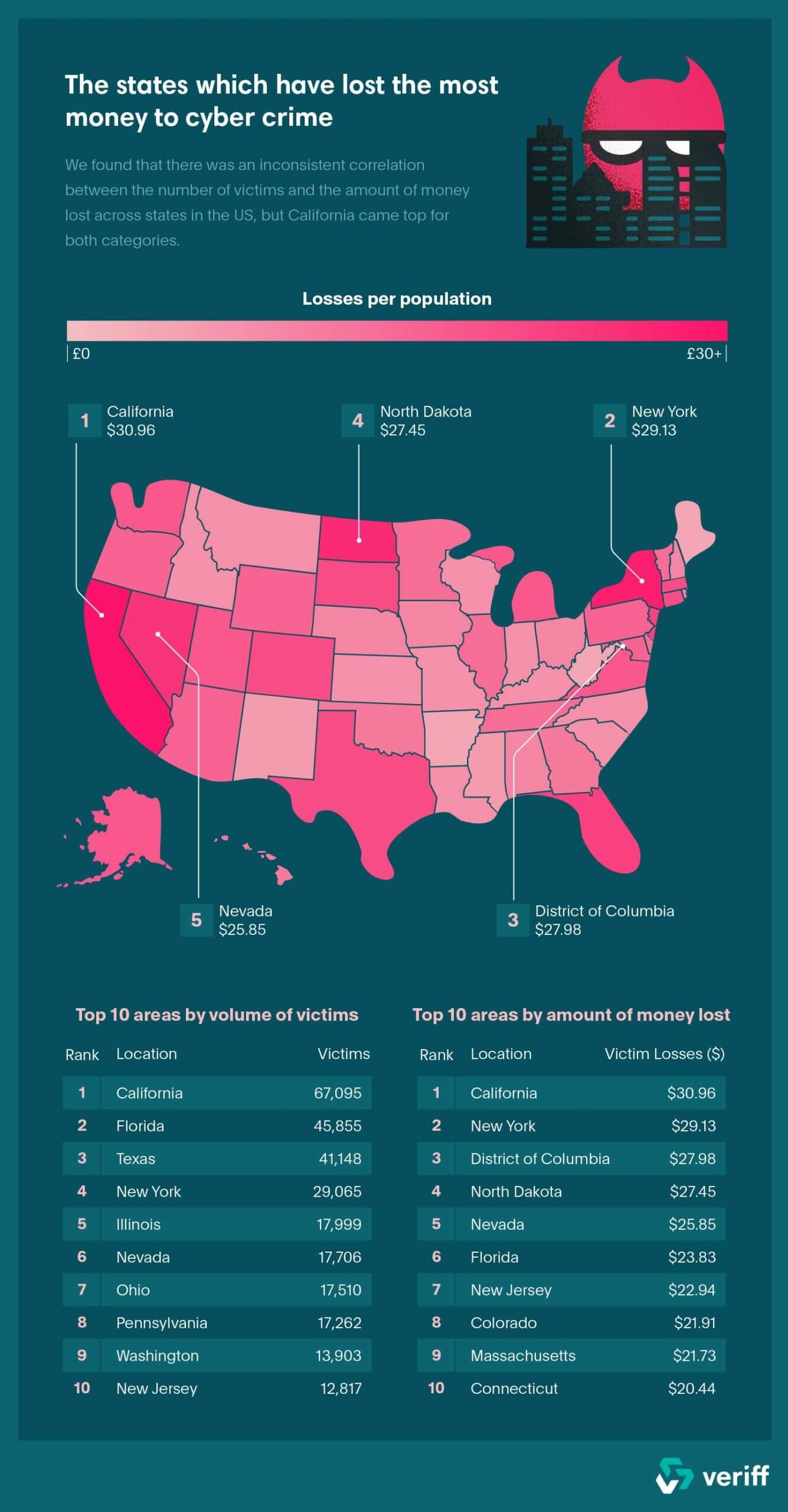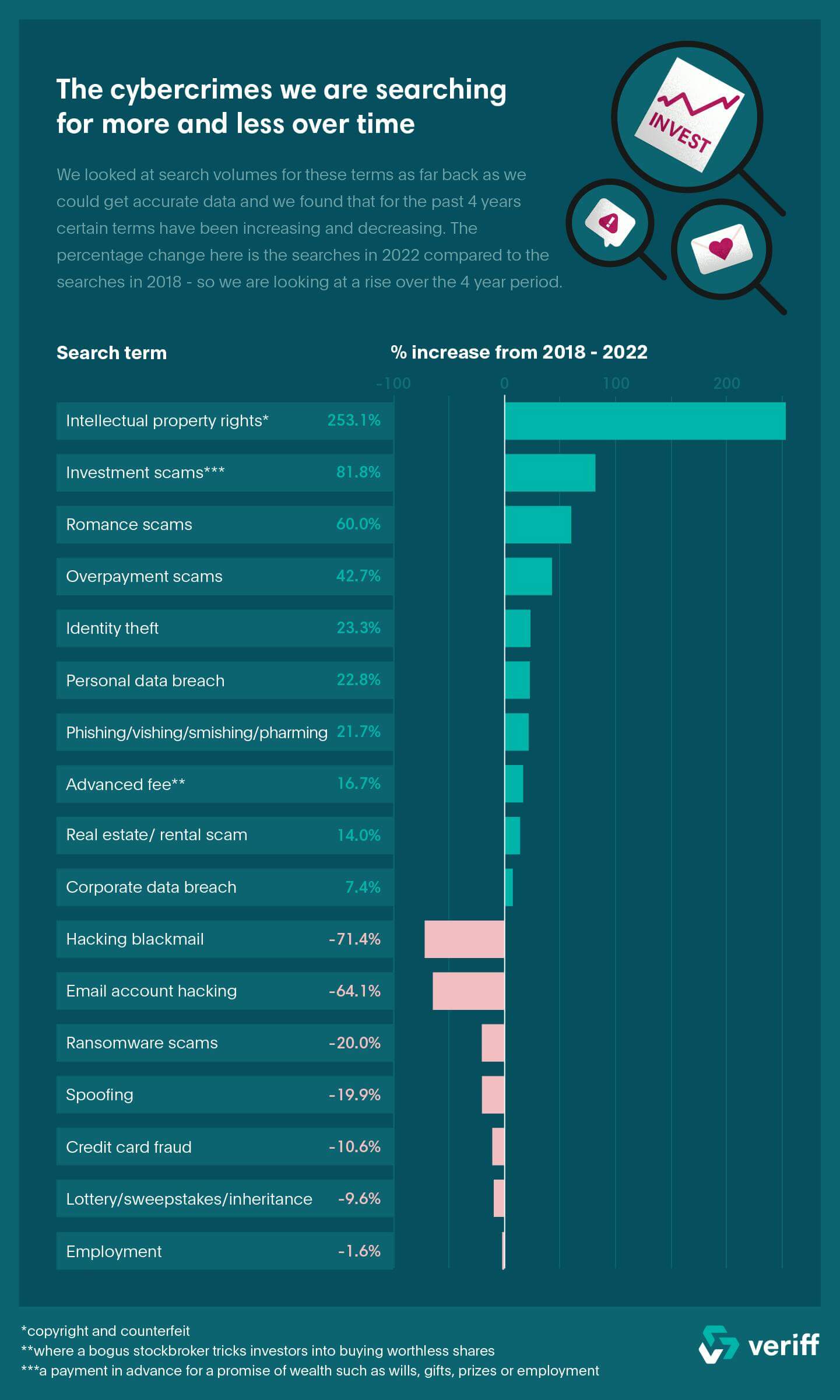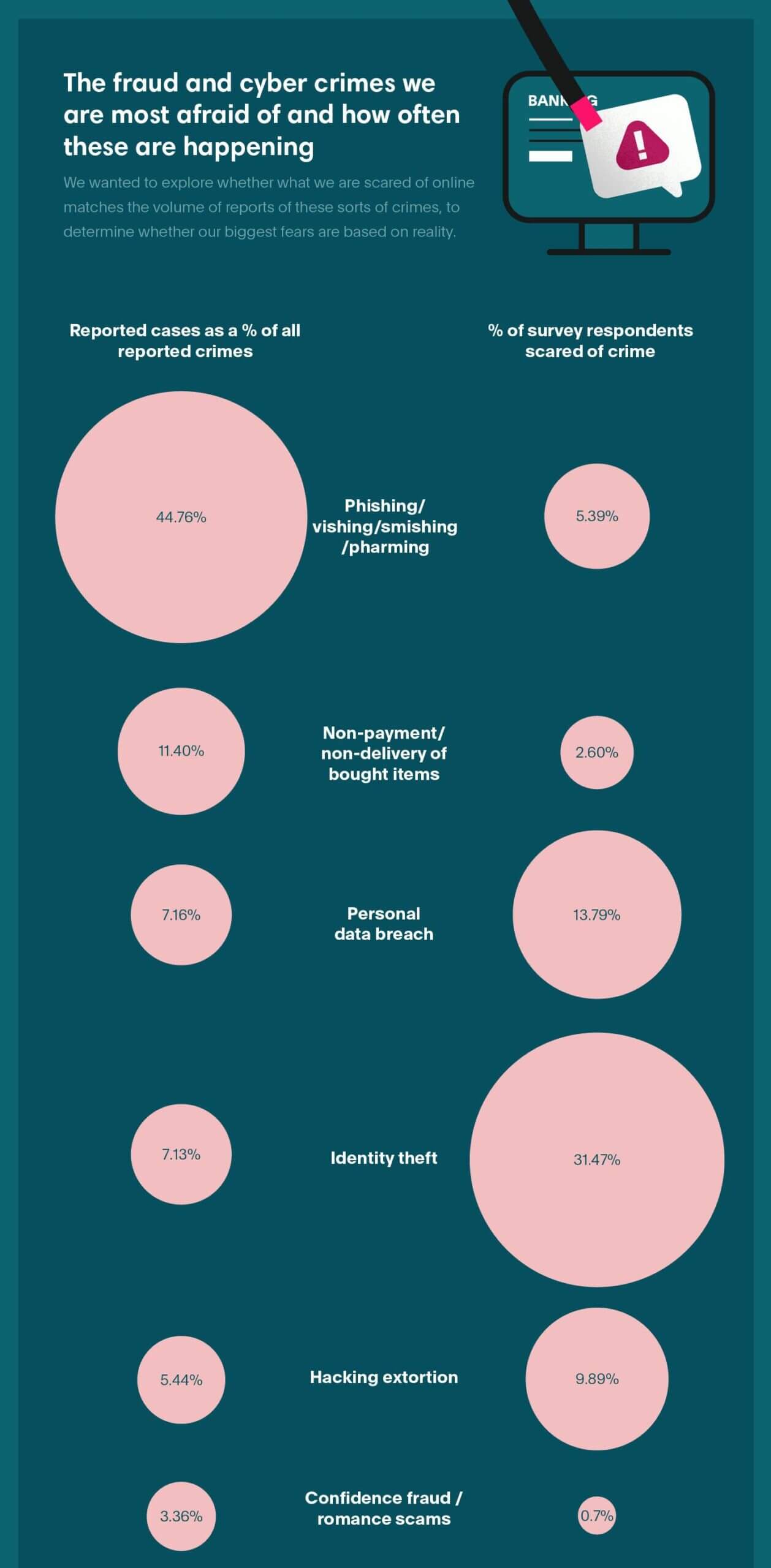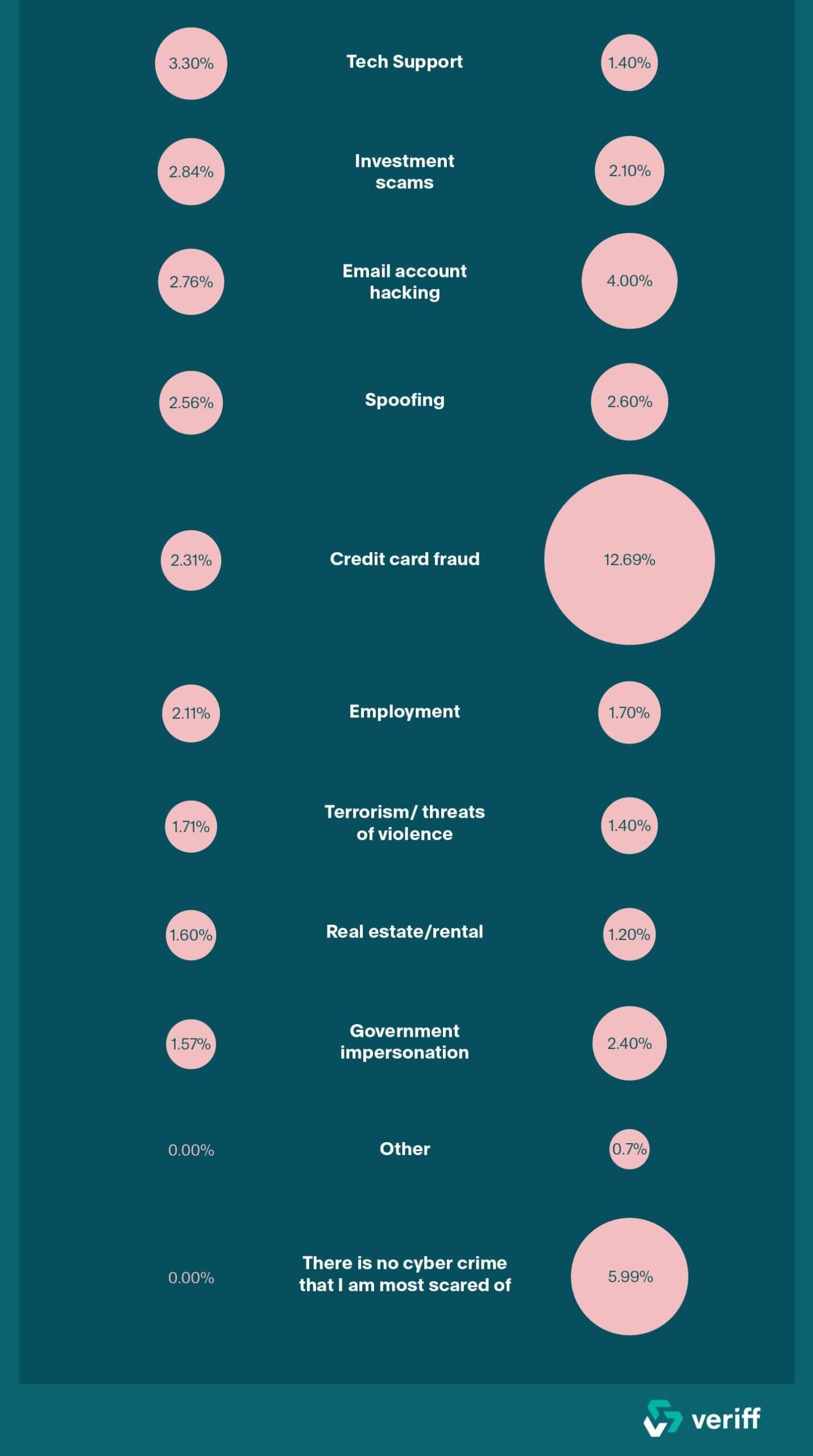Blog Post
Fighting the scariest things online in the US
Here at Veriff, we know how important it is to stay safe online. So we wanted to find out what frauds and cyber crimes are being reported the most frequently, which are costing us the most and which we are most worried about. We analyzed Google search data and a survey of 1,000 US adults, alongside the FBI’s Internet Crime Report 2021 data, to find out what we’re most scared of online and how often these things are happening.

87% of survey respondents stated that they were afraid of being victim to a cyber crime while using the internet, with almost one in three being afraid of identity theft. It’s easy to see why, as according to the FBI’s Internet Crime Report 2021, which analyzed reports in 2021, there have been 496,501 reports of cyber crime and a total of $6,117,058,765 has been lost across the US.
Hopefully, with advances in online identity verification and biometric authentication the online world, including the metaverse will become a safer place.

The states which have lost the most money to cybercrime
We found that there was an inconsistent correlation between the number of victims and the amount of money lost across states in the US, but California came top for both categories.
California is revealed to be the state which has the largest number of cybercrime victims, at 67,095. Florida came in second place for volume of victims, with 45,855, and Texas came in third with 41,148. New York was home to the fourth most victims at 29,065 in 2021 alone.
California also saw the largest financial losses at $1.2 billion – which works out at an average of $17,885 per report or $30.96 per resident. New York came in second place and reportedly lost $559.9 million to cyber crime, working out as the biggest losses per report at $19,263 and $29.13 per resident. District of Columbia came in third place with losses of $27.98 per resident.

The cyber crimes we are searching for more and less over time
We looked at search volumes for these terms as far back as we could get accurate data and we found that for the past 4 years certain terms have been increasing and decreasing. The percentage change here is the searches in 2022 compared to the searches in 2018 – so we are looking at a rise over the 4 year period.
The crime which has seen the largest increase in search interest is ‘intellectual property rights, copyright and counterfeit’ which has seen a huge 253% increase since 2018. This spike in search interest could be explained by the increase in NFTs and the concept of owning an online image.
‘Investment scams’ is the second fastest growing term with an increase in searches of 82% since 2018. This could have been a result of criminals taking advantage of vulnerable people who may have found themselves in financial trouble since the COVID-19 pandemic.
‘Romance scams’ has seen a 60% increase since 2018, inspired by the rise in popularity of online dating apps and increased interest in infamous romance scams, such as the Netflix documentary ‘The Tinder Swindler’.
There have been terms which are decreasing in search popularity too, like ‘hacking blackmail’, which has decreased by 71%, followed by ‘email account hacking’ which decreased by 64%. The falling interest in these terms could be because of improved security features that websites have begun using which makes life harder for hackers.
Other terms which are being searched for less are ‘ransomware scams’ (-20%), ‘spoofing’ (-20%) and ‘credit card fraud’ (-11%).


The cyber crimes we are most afraid of and how often these are happening
We wanted to explore whether what we are scared of online matches the volume of reports of these sorts of crimes, to determine whether our biggest fears are based on reality.
Our survey revealed that we are most afraid of identity theft, with 32% of respondents reporting this to be their biggest fear. In second place was personal data breach (14%), followed by credit card fraud (13%), extortion (10%) and phishing/vishing/smishing/pharming scams (6%).
But when we look at the actual number of reports we can see a slightly different story. The most commonly reported type of crime was phishing/vishing/smishing/pharming scams, with 323,972 reports made in 2021. The second most commonly reported crime was non-payment and non-delivery of bought items; making up 11% of all reports but only being listed as 3% of people’s biggest fear. In third place was the biggest fear of 14% of survey respondents – personal data breach, which made up 7% of all reports.
The crime we are least afraid of is confidence fraud, AKA romance scams, which only 0.7% of respondents reported as their biggest fear. Confidence fraud/romance scams are actually the sixth most common internet crime – with 24,299 reports, equating to 3% of all reported crimes. It’s easy for scammers to take advantage of their victims by tapping into their emotions so it’s important that we all educate ourselves on what internet crimes are happening and the best ways to keep ourselves safe.
At Veriff we take fraud and identity theft very seriously, you can find out more about the impact of fraud in our reports and you can get an even more in depth view in our Identity Fraud Report.
Methodology
We analyzed the FBI’s Internet Crime Report 2021* to establish a list of the most common internet crimes, alongside the number of victims per crime, the amount of dollars victims lost per crime and state by state breakdowns.
We pulled search volume data from Google Keyword Planner. For some crimes from the government data the wording was changed to match what a user would search in order to create reliable results. In cases where there is more than one scam per crime we collected individual search volumes and then added them together.
We then surveyed 1,000 US adults to find out which internet crime they are most afraid of when using the internet.
Finally, we compared the results to find out whether the things we are searching for and the things we are afraid of match up to the real crime statistics.
Some crimes have been omitted from the list where comparable data was not available.
*FBI data only includes self-reported cases of cybercrime, however Donna Gregory, the unit chief at the FBI’s IC3, said in an interview with Time magazine that only 10 to 12% of cybercrime victims reach out for help.
Get in touch if you have any questions regarding the methodology.
Data correct as of May 2022.
How can Veriff help
Veriff is a global online identity verification company that enables organisations to build trust with their customers through intelligent, accurate, and automated online identity verification. Our technology helps to match a person with their government-issued ID. Knowing the identity of your customers and users helps to protect users and children in the metaverse.













